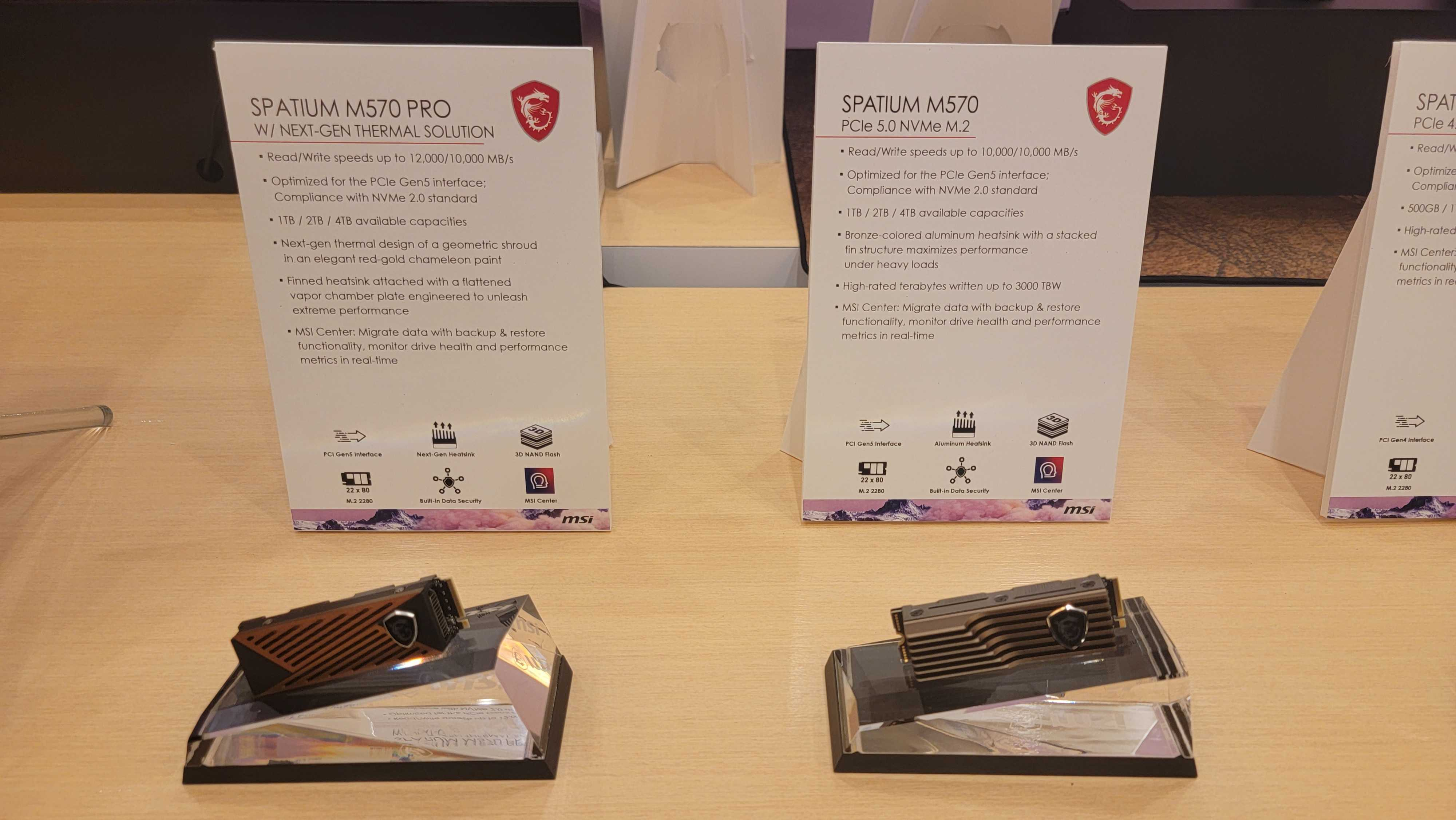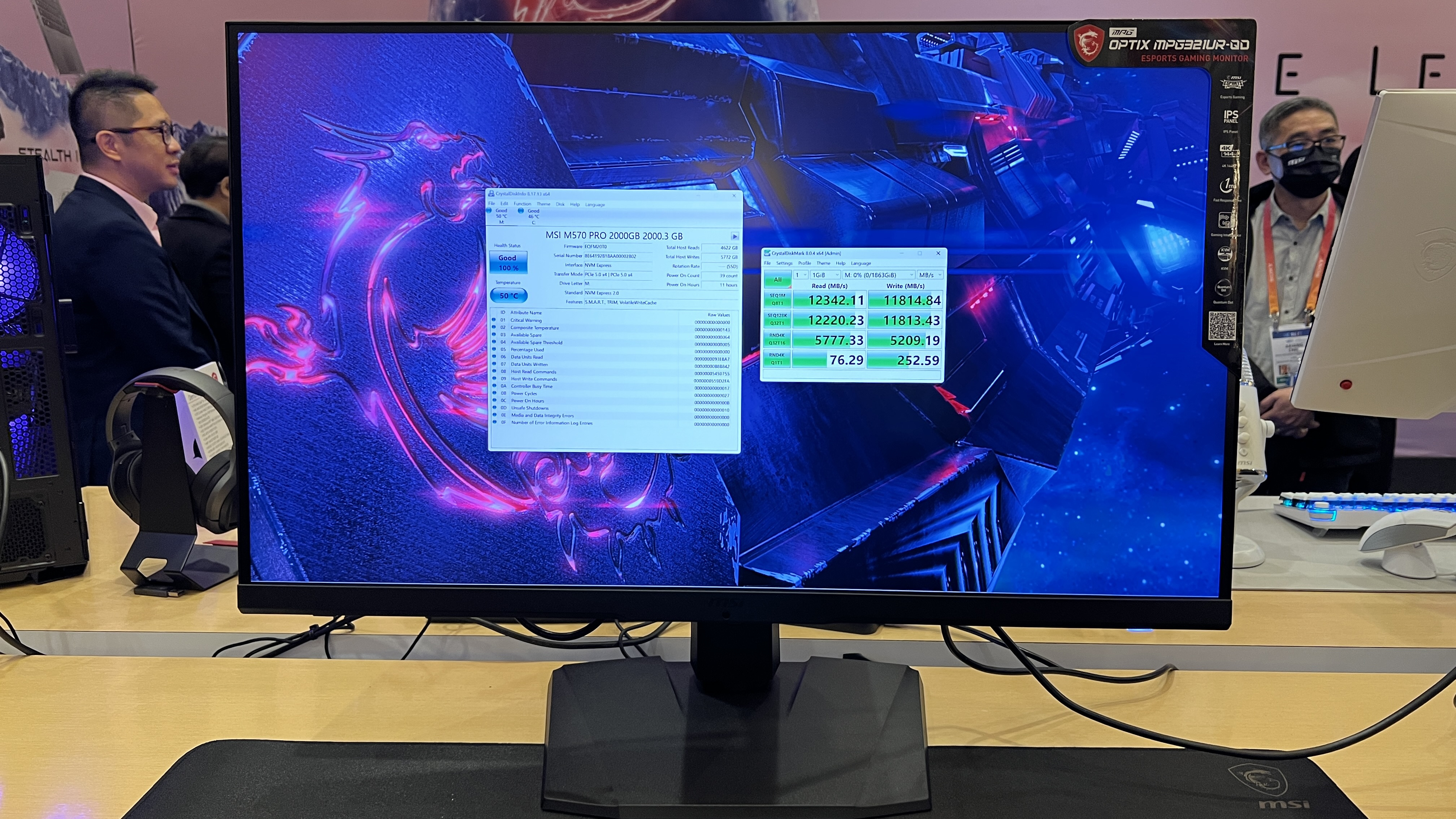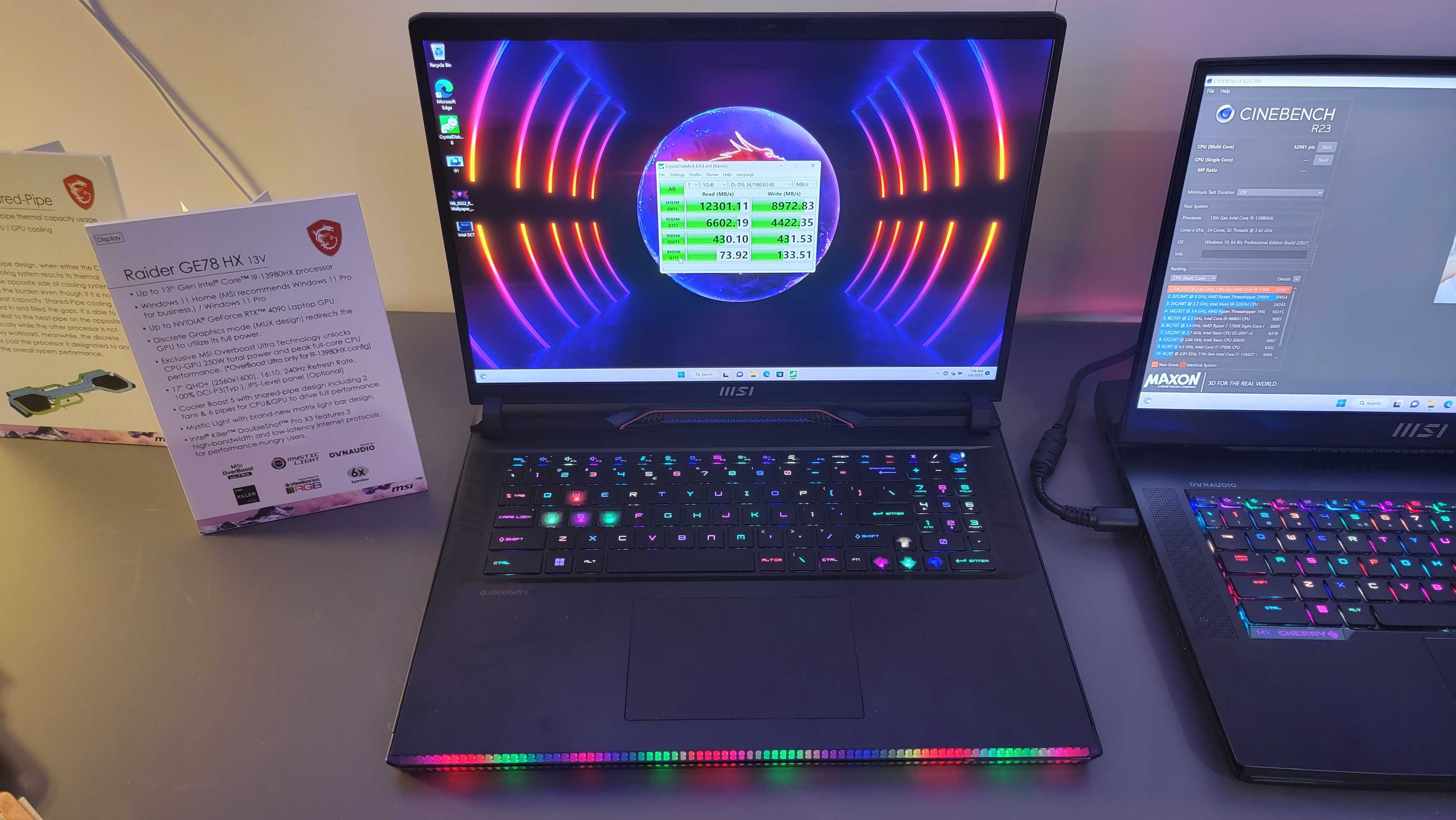MSI PCIe 5.0 SSD Debuts with 12 GBps Reads, 10 GBps Writes
Spatium M570 Pro uses a Phison E26 controller and Micron 232-layer NAND.
This week, we got our first opportunity to benchmark a PCIe 5.0 SSD, but that was an engineering sample based on Phison's E26 controller, not a shipping product that consumers will be able to buy. Today, MSI has announced two new, PCIe 5.0 SSDs -- the Spatium M570 Pro and Spatium M570 -- which are the first PCIe 5.0 drives we've seen that you will actually be able to buy as shipping products.
At MSI's CES demo suite, we got to see both drives, but more importantly, we got to see early benchmark results from the Spatium M570 Pro, which boasts sequential read and write speeds of 12,000 and 10,000 MBps respectively. MSI is launching both drives in Q2 of this year for undisclosed prices and the M570 Pro is also going to be available as an option in its Raider GE78 HX and Titan GT77 HX laptops.
Both MSI Spatium drives use Phison's E26 controller, but the M570 Pro will use Micron's new 232-layer NAND flash that runs at 2,400 MHz, allowing it to have faster speeds while the M570 non-pro is using slower 1,600 MHz memory that only allows it to get up to 10,000 MBps reads. Because the 2,400 MHz flash isn't available in significant quantities yet, we won't see the Pro until Q3 of 2023. Meanwhile, the non-Pro will launch in Q1.
The drives will be available in 1, 2 and 4TB capacities that come both with and without heatsinks. The units we saw on display had beautiful heatsinks emblazoned with MSI's logo on them. The heatsink on the M570 Pro is finned with a vapor chamber plate and a geometric shroud that has reddish-gold paint. The M570 regular has an aluminum heatsink with stacked fins and bronze coloring.
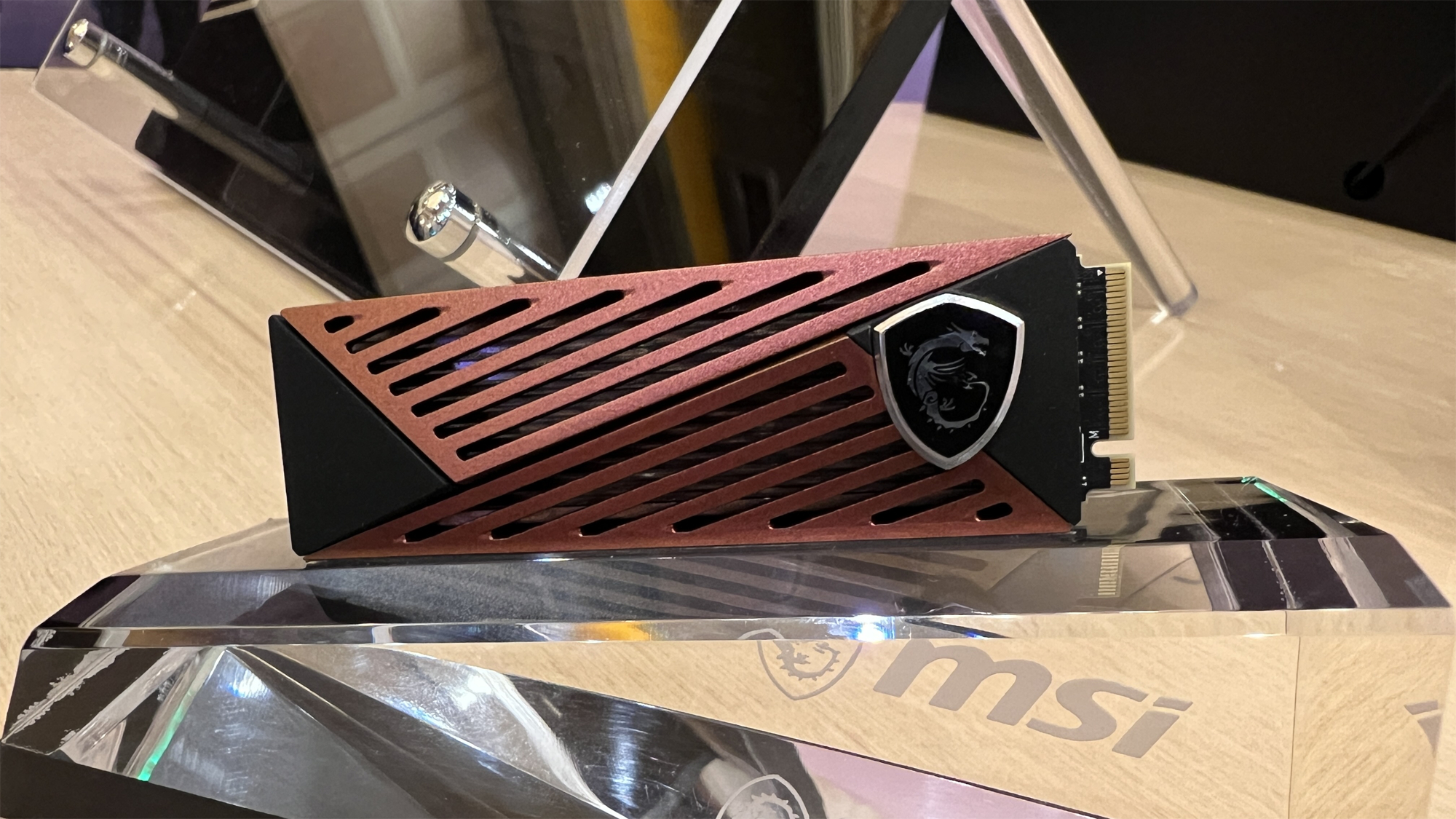
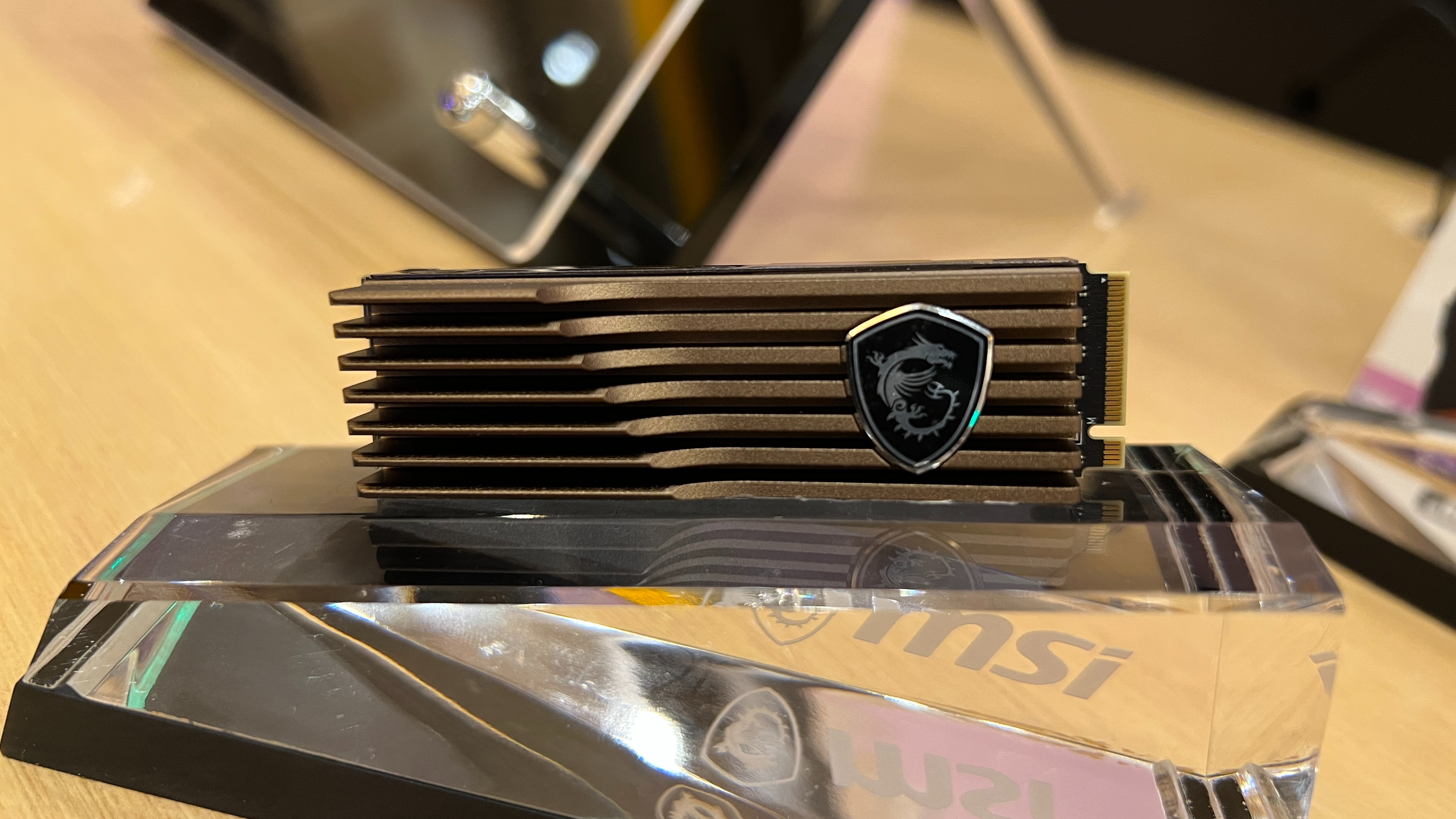
MSI Spatium M570
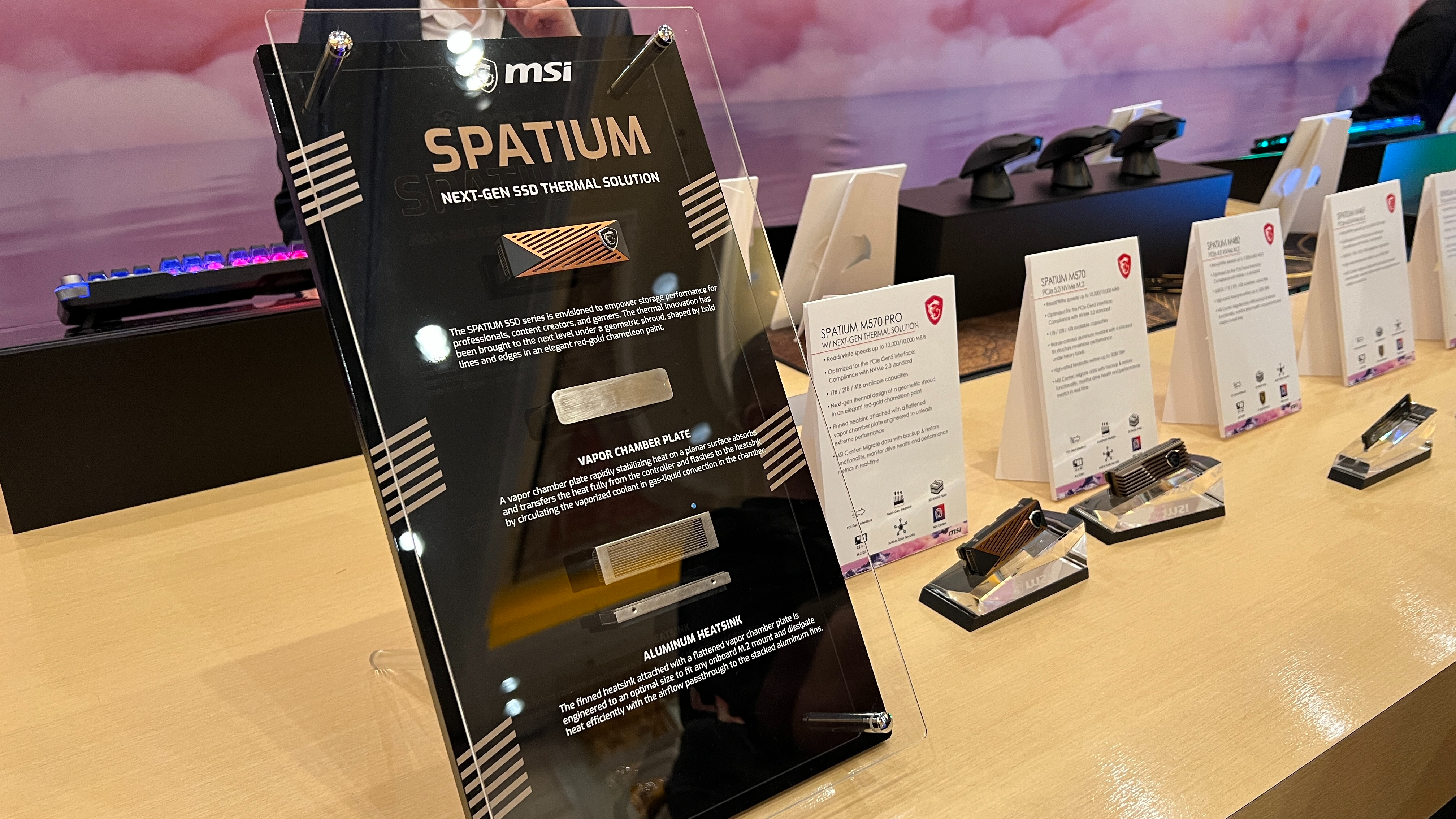
At MSI's suite, we got to see two different sets of CrystalDiskMark results for a 2TB Spatium M570 Pro, one taken on a custom-built MSI desktop and another on a Raider GE78 HX laptop. The desktop had a Ryzen 9 7950X CPU, an MSI MPG X670E Carbon EK X D-RGB motherboard, an EK waterblock, RTX 4090 graphics and 32GB of DDR5 RAM.
As you can see in the image above, the 2TB M570 Pro returned the following results on the custom desktop.
| Test | Read (MBps) | Write (MBps) |
|---|---|---|
| SEQ 1M Q8T1 | 12,342.11 | 11,814.84 |
| SEQ 128K Q32T1 | 12,220.23 | 11,813.43 |
| RND 4K Q32T16 | 5,777.33 | 5,209 |
| RND 4K Q1T1 | 76.29 | 252.59 |
On the Raider laptop, those numbers were just a little lower, with the top line sequential read / write hitting 12,301.11 and 8,972.83. Clearly, having a full-power desktop with good cooling goes a long way.
Get Tom's Hardware's best news and in-depth reviews, straight to your inbox.
The numbers from the MSI Spatium M570 Pro simply blow away the speeds we see on the best SSDs today, including Samsung's 990 Pro, which is rated for just 7,450 MBps reads and 6,900 MBps writes.
Will you benefit from all of that speed? A PCIe 5.0 SSD like the Spatium M570 Pro probably won't help you open Chrome browser much faster, but when Microsoft's DirectStorage becomes widely adopted, it will take advantage of the added bandwidth to make your games faster, perhaps even eliminating the time you spend waiting for the next level to load.
Avram Piltch is Managing Editor: Special Projects. When he's not playing with the latest gadgets at work or putting on VR helmets at trade shows, you'll find him rooting his phone, taking apart his PC, or coding plugins. With his technical knowledge and passion for testing, Avram developed many real-world benchmarks, including our laptop battery test.
-
hotaru251 kind of w/e about any improved speed for ssd's.Reply
theres very little real world benefit atm over pcie 4.0's speeds and these will consume more pwr and output more heat for basically nothing. (on top of ofc higher price tag)
directstorage games are gonna get loaded what... 1.5seconds faster than now? (only take liek 5-10 sec to load as is) not really game changer in itself. -
TechieTwo So the PCI 5.0 SSDs are going to be available almost a year later than advertised in '22. Bad marketing for sure. Apparently they don't expect consumers to be queued up to buy these.Reply -
PlaneInTheSky I won't buy an SSD that needs a massive heatsink. Data integrity is very sensitive to heat.Reply
PCI 4.0 is more than fast enough, PCI 5.0 SSD are just running way too hot. -
Leptir Replyhotaru251 said:theres very little real world benefit atm over pcie 4.0's speeds and these will consume more pwr and output more heat for basically nothing. (on top of ofc higher price tag)
directstorage games are gonna get loaded what... 1.5seconds faster than now? (only take liek 5-10 sec to load as is) not really game changer in itself.
I agree, I really don't see any real world benefits except for some very specific and unlikely scenarios. The 990 Pro (PCIe 4.0) leaves this drive far behind in random performance and that's what counts most of the time. I'm sure that eventually 5.0 drives will be superior, but for 2023 I plan to upgrade my 980 Pro with the 4 tb 990 Pro as soon as it becomes available, not a 5.0 drive. -
DavidLejdar Then again, when one has a big browser cache, and reloads some tabs from it...Reply
Such is not an usual scenario of course. More likely the case for many is that there is a swap file... And in any case, whether one can make use of increased bandwith, that can be checked with a hardware monitor (to see whether i.e. Gen4 drive tops out during everyday use, assuming the CPU is not a bottleneck about that).
For me, generally quite appealing is that Gen5 drives can have up to 32 TB capacity. And the increased bandwidth I may not make full use of soon. But the way I see it, if I end up spending quite some on a new CPU soon (3D V-Cache), and later on possibly also a new GPU, then saving a few bucks on the drive, which may end up being a bottleneck, not worth that saving. Which drive will perform how, and at what price, that isn't clear yet of course.
And this is talking about moving towards 4K gaming though, where the performance isn't just about a loading screen, with games a bit more demanding than e.g. CS and PUBG. By which I just mean to point out that many a gamer sure may not see much a difference between using a Gen3 or Gen5 drive, but there are use cases where it is nice that Gen5 is coming, in particular as it enables CPUs and GPUs to grow further. -
USAFRet Reply
"theres very little real world benefit atm over pcie 3.0's speeds"hotaru251 said:theres very little real world benefit atm over pcie 4.0's speeds
FTFY -
dstarr3 Reply
In an ideal world, non-volatile storage would be as fast as RAM and thus RAM would no longer be necessary. Any step towards that is worthwhile.hotaru251 said:kind of w/e about any improved speed for ssd's.
theres very little real world benefit atm over pcie 4.0's speeds and these will consume more pwr and output more heat for basically nothing. (on top of ofc higher price tag)
directstorage games are gonna get loaded what... 1.5seconds faster than now? (only take liek 5-10 sec to load as is) not really game changer in itself. -
watzupken Reply
Totally agree with this. The increase in the sequential transfer rate does nothing for most users, other than running some benchmark to see a higher number. This is akin to the infamous megapixel race with cameras in the past. Most users won't see any difference in picture quality, other than those who few that prints the shots for big posters. And to be honest, even if one is to compare the responsiveness of their system between 1 that uses a SATA 3 SSD and other with a PCI-E 4.0 NVME SSD, I don't think anyone can discern the difference. Difference in game loading time is also negligible.USAFRet said:"theres very little real world benefit atm over pcie 3.0's speeds"
FTFY -
Jack1923 Reply
Yes, but...in an ideal world, non-volatile storage would also have the infinite write endurance of RAM. Which you would definitely need if you were going to use it as a RAM replacement.dstarr3 said:In an ideal world, non-volatile storage would be as fast as RAM and thus RAM would no longer be necessary. Any step towards that is worthwhile.
